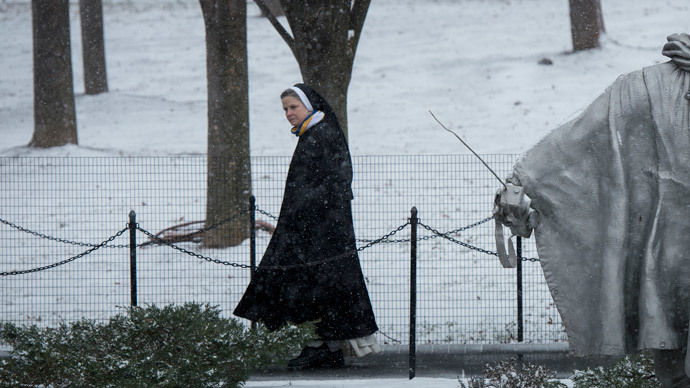A US judge has handed down sentences to three peace activists, including an 84-year-old nun, who were convicted of breaking into a Tennessee defense facility where enrichment material for nuclear weapons is held, and staging a protest on federal property.
Sister Megan Rice, 84, Greg Boertje-Obed, 57, and Michael Walli, 63, were found guilty in May of destroying US government property and causing more than $1,000 in damage to federal property in the demonstration.
The trio cut a hole in a chain-link fence in the early morning hours of July 28, 2012 and gained entry to the Y-12 National Security Complex in Oak Ridge, Tennessee. They walked nearly a mile from there, apparently strolling into what was previously thought to be one of the most tightly guarded uranium processing plants in the US. Once inside, the three activists hoisted banners, spray-painted messages, and used human blood to write messages on a building where uranium is stored.
A guard only came upon the three an hour later, at which point they offered him food and began singing.
The embarrassment forced Congress to investigate with a series of hearings, and then issue a list of security recommendations to the Department of Energy and the National Nuclear Security Administration – the agency in charge of Y-12 and seven other nuclear weapons facilities.
Rice was sentenced to 35 months in prison for her role in the protest. Walli and Boertje-Obed each received 62 months for their part, along with three years of supervised release when they are freed.
US District Judge Amul Thapar explained that Rice was given less time because she “does not have the extensive criminal records the others have. Her crimes are minimal in comparison to the others.”
Yet Rice used her time at a four-hour hearing Tuesday to ask the judge not to take it easy on her for any reason.
“Please have no leniency on me,” she said. “To remain in prison for the rest of my life would be the greatest honor you could give me.”
The three are members of the Plowshares Movement of Christian pacifism. The group is known for organizing symbolic demonstrations that often include damaging weapons or military property. Like-minded activists have participated in similar activity in the recent past, including a 1980 event in which eight people trespassed onto a Pennsylvania nuclear facility and poured blood on documents and other various files.
Prosecutors alleged that the break-in was a serious breach of US national security that put lives at risk. Experts in both the scientific and security fields did not contend that the action was against the law – though they cautioned authorities to note that by staging a peaceful protest, the demonstrators may have initiated a security update that would prevent a truly violent attack in the future.
Edwin Lyman, a nuclear security expert at the non-profit Union of Concerned Scientists, said in January that the protesters gave the authorities valuable insight.
“We think, even though they were convicted of a federal crime, there are mitigating circumstances and they made the country safer,” Lyman wrote.
The legal guideline would have permitted the judge to hand down a 20-year sentence for each person. Defense attorneys argued that sentences for time served would have been sufficient. One of the charges they were facing was the Federal Sabotage Act of 1918, a scarcely-prosecuted law that was signed when the US was fighting in World War I.
Michael Quigley, a Loyola University law professor who has worked to help defend the activists, sought to advise the court that they are not the intended targets of the law, which was strengthened in 1940 and 2001.
“Michael, Greg, and Sister Megan are not the saboteurs, the spies, the bomb making terrorists, or the kind of offenders Congress anticipated when it created the Federal Sabotage Act,” Quigley wrote.
Witnesses said Judge Thapar visibly struggled with the sentencing guidelines during the Tuesday hearing.
“At some point, the law has to command respect, and there is a lawful way to change it,” he said before doling out sentences far thinner than he could have.
Ralph Hutchison, a friend of Sister Rice who serves as coordinator for the Oak Ridge Environmental Peace Alliance, told Mother Jones that in many ways, Sister Rice’s sentence does not matter.
“It’s of absolutely no consequence to her. As a nun she strongly believes that she is called to be a servant of God wherever she is,” he said. “They feel that nuclear weapons are the single greatest threat to God’s creation that exists in the world today.”

